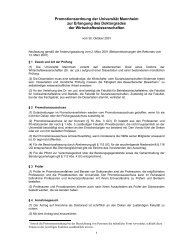Modulkatalog - Abteilung VWL - Universität Mannheim
Modulkatalog - Abteilung VWL - Universität Mannheim
Modulkatalog - Abteilung VWL - Universität Mannheim
Erfolgreiche ePaper selbst erstellen
Machen Sie aus Ihren PDF Publikationen ein blätterbares Flipbook mit unserer einzigartigen Google optimierten e-Paper Software.
Titel des Moduls Panel data methods and related topics<br />
Art und Verwendbarkeit<br />
des Moduls<br />
Dauer des Moduls 1 Semester<br />
ECTS-Punkte 6<br />
Wahlveranstaltung im Bachelorstudiengang Volkswirtschaftslehre; ggf.<br />
Wahlveranstaltung in zahlreichen anderen Bachelorstudiengängen der<br />
<strong>Universität</strong> <strong>Mannheim</strong><br />
Lehrmethode Vorlesung (2 SWS) plus Übung (1 SWS)<br />
Arbeitsaufwand Präsenzzeit Vorlesung: 21 Stunden, Präsenzzeit Übung: 10,5 Stunden, Zeit<br />
für Selbststudium, die Bearbeitung der Aufgaben, Klausurvorbereitung und<br />
Klausur: 148,5 Stunden<br />
Turnus des Angebots jedes Frühjahrssemester<br />
Zahl der<br />
Teilnehmer/innen<br />
Unterrichtssprache Englisch<br />
Teilnahmevoraussetzungen<br />
Ziele und Inhalte des<br />
Moduls<br />
Erwartete Kompetenzen<br />
nach Abschluss des<br />
Moduls<br />
Voraussetzungen für die<br />
Vergabe von ECTS-<br />
Punkten und Benotung<br />
abhängig von den Wahlentscheidungen im Spezialisierungsbereich<br />
Statistik I und II, Grundlagen der Ökonometrie<br />
The objective of this Bachelors elective course is to familiarize students<br />
with some panel data methods and related techniques used in modern<br />
empirical research. Topics to be covered include:<br />
1. Linear panel data models (with unobserved effects) for policy analysis<br />
using the fixed effects and random effects estimators<br />
2. Instrumental variables and the two stage least squares estimator<br />
3. Identifying and estimating simultaneous equations models<br />
4. Logit and Probit estimators for binary choice models and conditional<br />
Logit for panel data<br />
5. Models for censoring and truncation<br />
The treatment of these topics is self contained and emphasizes both theory<br />
and practice. In particular, most problem sets will require the students to<br />
use the econometric package STATA.<br />
This course will enable students to process and interpret empirical data and<br />
test whether they are in accordance with economic theory. After taking this<br />
course the students should have a broad understanding and better<br />
appreciation of econometric models and techniques used by applied<br />
economists to answer policy related questions. This will enhance their<br />
problem solving skills and consequently their career prospects. Since the<br />
class is taught in English, this course should also help the students in<br />
acquiring appropriate English terminology thereby increasing their<br />
proficiency to read and write scientific economics texts in English.<br />
Grade will depend upon problem sets (30%) + in-class final exam (90<br />
minutes, 70%).<br />
44















